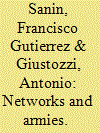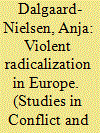| Srl | Item |
| 1 |
ID:
098888


|
|
|
|
|
| Publication |
2010.
|
| Summary/Abstract |
Lone wolf terrorism remains an ambiguous and enigmatic phenomenon. The boundaries of lone wolf terrorism are fuzzy and arbitrary. This article aims to define and analyze the main features and patterns of lone wolf terrorism in fifteen countries. Lone wolf terrorism is shown to be more prevalent in the United States than in the other countries under study. The cross-national analysis suggests that in the United States lone wolf terrorism has increased markedly during the past three decades; a similar increase does not appear to have occurred in the other countries under study. The numbers of casualties resulting from lone wolf terrorism have been relatively limited, and there is no evidence that the lethality of lone wolf terrorism is on the increase. The rates of psychological disturbance and social ineptitude are found to be relatively high among lone wolf terrorists. Lone wolf terrorists tend to create their own ideologies that combine personal frustrations and aversion with broader political, social, or religious aims. In this process, many lone wolf terrorists draw on the communities of belief and ideologies of validation generated and transmitted by extremist movements.
|
|
|
|
|
|
|
|
|
|
|
|
|
|
|
|
| 2 |
ID:
098887


|
|
|
|
|
| Publication |
2010.
|
| Summary/Abstract |
Until recently, the importance of organizational factors in the understanding of the variance of the behavior of state challengers had not been recognized. New studies and theories have underscored its crucial character. This article contends that challengers can be placed in a continuum constituted by two opposed polar types, army like and network associations, and compare the Afghan Taliban's and the Colombian Fuerzas Armadas Revolucionarias de Colombia (Revolutionary Armed Forces of Colombia-FARC)'s organizational principles from this point of view. The main claim is that organizationally inspired explanations behave much better than resource inspired ones when accounting for the differences between the Taliban and the FARC.
|
|
|
|
|
|
|
|
|
|
|
|
|
|
|
|
| 3 |
ID:
098886


|
|
|
|
|
| Publication |
2010.
|
| Summary/Abstract |
This study is interested in understanding public opinion in Pakistan toward terror attacks. Specifically, this study explores (1) the general picture of attitudes in Pakistan toward terrorism and (2) which individuals are most likely to support terrorism in Pakistan. The study aims to give insights into how pervasive a support base exists for terrorism as a tactic in Pakistan and it seeks to isolate the individual-level traits that account for the variation we see among Pakistani Muslims regarding their level of acceptance of terrorism against Pakistani and Indian targets. The study finds that a large majority of Pakistanis oppose terrorism but terrorism directed at Indian targets is more tolerated than terrorism against Pakistani targets. The study also finds that those who are most supportive of Talibanization in Pakistan are the most supportive of terrorism.
|
|
|
|
|
|
|
|
|
|
|
|
|
|
|
|
| 4 |
ID:
098884


|
|
|
|
|
| Publication |
2010.
|
| Summary/Abstract |
When, why, and how do people living in a democracy become radicalized to the point of being willing to use or directly support the use of terrorist violence against fellow citizens? This question has been at the center of academic and public debate over the past years as terrorist attacks and foiled plots inspired by militant Islamism have grabbed European and American headlines. This article identifies and discusses empirical studies of radicalization and points to the strengths as well as the weaknesses characterizing these studies. The aim is to take stock of the current state of research within this field and to answer the question: From an empirical point of view, what is known and what is not known about radicalization connected to militant Islamism in Europe?
|
|
|
|
|
|
|
|
|
|
|
|
|
|
|
|